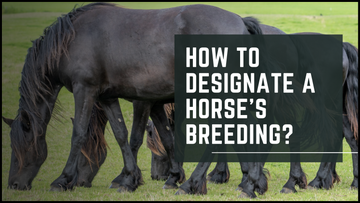When it comes to horses, their weight is a key factor that affects their health, strength, and performance. The average weight for diverse breeds of horses, and the stages of growth for ponies and foals, knowing how much do horses weigh is vital for both horse owners as well as enthusiasts.
This guide will look at the typical horse weight, the factors that affect it, and the reasons why it is important.
What Is the Average Horse Weight?
The average horse weight could be quite different depending on the horse's breed, age, and the diet that the animal follows. The average adult horse weighs 900 to 2,200 pounds. How much does a horse weight will be contingent on a variety of variables like breed, activity levels, and general well-being?
In general:
-
Light horse breeds, such as Arabians weigh between 900 and 1100 pounds.
-
Draft horses, such as Clydesdales may weigh anywhere from 1,800-2200 pounds.
-
The typical horse weight for a standard or warmblood horse is somewhere between approximately 1,200 and 1500 pounds.
What Influences Horse Weights?
Several factors affect horse weights, including:
-
Breed: Breeds have a huge role in determining how heavy is a horse. A thoroughbred horse weighs less than a draft horse.
-
Age: Horses that are younger, such as foals and ponies tend to weigh less. As they grow older the weight of their horses increases. In this article, we'll go over the details of how much a foal weighs and how much a full-grown horse weighs in the FAQ section.
-
Diet and Exercise: A horse that is well-fed and regularly exercised is more likely to keep a healthy weight and are healthier than horses that have poor nutrition or inadequate exercise and could have a problem with weight or being overweight.
-
Workload: Horses that are used to work, like racers or for farm work are more likely to gain muscle. This can lead to the weight being heavier. It's vital to remember that muscle weights are higher than fat. So horses with good muscle could weigh more, but be healthy and fit.

Why Is Knowing the Weight of a Horse Important?
Understanding a horse’s weight is crucial for several reasons:
-
Health Management: Being able to check your horse's weight can allow you to monitor the overall health of your horse. An abrupt drop or increase in weight may suggest a medical issue.
-
Diet and Feeding: The horse needs a well-balanced diet to keep their weight. Understanding the avg horse weight will allow you to determine the proper feed portion.
-
Tack and Equipment Fit: Saddles, bridles, and various other items must be fitted according to the horse's weight. Incorrect fitting can cause discomfort or even injury.
-
Medicinal Dosage: When administering medications for horses, knowing how much a horse weighs will ensure that the dose is precise. Dosing too much or not enough can cause serious harm.
Weight Categories: How Heavy Is a Horse?
While we’ve established that horse weights vary based on breed and purpose, let’s break down some of the common weight ranges for different types of horses:
-
Draft Horses: They are the biggest and heaviest horses that were used in the past to work on farms and pull heavy loads. Breeds such as Percheron or Shire are examples. Shire or Percheron could weigh anything from 1,800-2,200 pounds.
-
Light Horses: They are commonly horse breeds, including sports and riding horses similar to Arabians, Thoroughbreds, and Quarter Horses. They typically weigh between 900 to 1,300 pounds.
-
Ponies: Even though they're smaller, can still hold an adequate amount of weight considering their size. They weigh anywhere between 400-900 pounds. However, their small size doesn't mean they are in any way less capable.

Maintaining the Ideal Horse Weight
A regular schedule of vet check-ups is crucial to keeping your horse healthy and to ensure that their weight remains within the healthy level. A balanced diet consisting of high-quality hay, grains, and other supplements, in conjunction with regular exercise, will avoid health problems associated with weight.
Also, having your horse weighed often or using an appropriate weight tape could aid in tracking any changes. Being able to spot a major weight shift earlier can help you tackle any health issues before they become dangerous.
Being aware of how much horses weigh and the factors that affect their weight are crucial to every horse's owner. From figuring out the horse average weight to tracking the health of your horse and its diet and weight control, your horse must remain fit, healthy, and to their full potential.
Ensure your horse stays healthy and well-cared for with our premium selection of horse care products! From high-quality feed to grooming essentials, we have everything you need to maintain your horse's and overall well-being.
Shop now at The Epic Animal and give your horse the attention they deserve!
FAQs
-
How much does a pony weigh?
Ponies generally weigh between 400 and 900 pounds, with some variations depending on the breed.
-
How much does a foal weigh?
A foal usually weighs between 50 to 120 pounds at birth, and they gain weight quickly during their first year of life.
-
How much does a full-grown horse weigh?
A full-grown horse can weigh anywhere from 900 to 2,200 pounds, with lighter breeds weighing closer to the lower end and draft breeds reaching the upper limits.
-
How much does a thoroughbred weigh?
A thoroughbred horse typically weighs between 1,000 and 1,200 pounds, which is relatively light for their height, helping them excel in speed.
-
How much do ponies weigh?
Ponies, although smaller, can weigh between 400 and 900 pounds, depending on the breed and their overall condition.
Read More Blogs Here:








